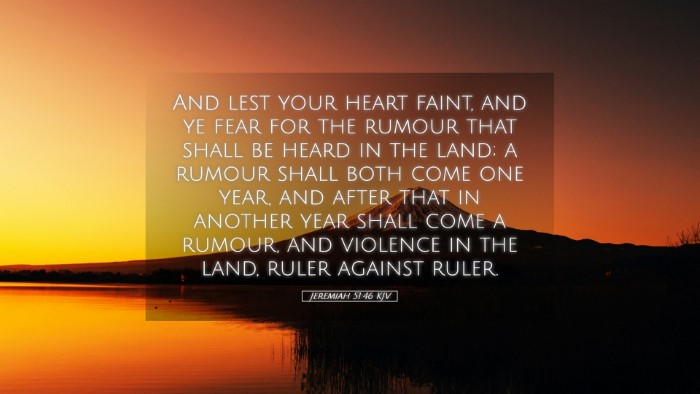Commentary on Jeremiah 51:46
Verse Context: Jeremiah 51:46 states, "And lest your heart faint, and ye fear for the rumor that shall be heard in the land; a rumor shall both come one year, and after that in another year shall come a rumor, and violence in the land, ruler against ruler." This verse reflects the tumultuous times that the prophet Jeremiah foresaw for Babylon and serves as a somber warning for its inhabitants.
Insights from Matthew Henry
Matthew Henry emphasizes the significance of the prophet delivering a message of both warning and consolation to the people of God. He points out that even amidst impending judgments, God sends warnings to prevent despair among His people. This verse serves as an exhortation to remain steadfast and not to be swayed by the rumors of terror entering the land.
- Hearts Fainting: Henry notes that the warnings to not let their hearts faint suggest a deep pastoral concern for the emotional and spiritual well-being of the people. The fear of rumors can lead to discouragement and a crisis of faith, especially in troubled times.
- Call to Vigilance: He draws attention to the fact that the repetition of rumors indicates the ongoing nature of instability. He encourages readers to remain firm in their faith and vigilant against despair.
Insights from Albert Barnes
Albert Barnes adds a historical context to this verse, interpreting it within the broader narrative of Babylon's impending fall. He points to the idea that these 'rumors' represent the internal strife and divisions that would engulf the nation. The phrase 'ruler against ruler' is particularly significant as it highlights the political chaos that can lead to a nation's destruction.
- Internal Strife: Barnes expresses that this fragmentation among rulers indicates systemic issues within Babylon's leadership. When there is no unity among those in power, rumors often spread, contributing to instability.
- Spiritual Implications:He warns that believers should heed these signs as a call to understand the sovereignty of God in history. He underscores that God's judgment does not come without warning, encouraging believers to strengthen their faith amidst societal upheaval.
Insights from Adam Clarke
Adam Clarke provides an in-depth analysis that highlights the texture of the text and its theological implications. He notes that the ‘rumors’ serve a dual purpose: they are a means by which God communicates the seriousness of the situation and an avenue to warn the people of their impending doom.
- The Nature of Prophecy: Clarke emphasizes the prophetic nature of Jeremiah’s message. The repetition of rumors serves to remind believers of God's persistent warning of judgment and the need for repentance.
- Encouragement to the Faithful: He also reassures the faithful that they should not be overtaken by fear, as it is God’s intent to guide and protect His people, even in chaos.
Application for Pastors and Theologians
For pastors and theologians, Jeremiah 51:46 serves as a vital scripture that speaks not only to the historical circumstances of Babylon but also to the spiritual condition of humanity in general. The concepts found within this verse can be utilized for preaching and teaching about fear, rumor, and the response of the faithful in times of distress.
- Addressing Fear: Pastors can draw from this verse to counsel congregants facing fears and uncertainties today, helping them to rely on God’s promises rather than succumbing to despair.
- Encouragement to Seek Unity: In congregational settings, there is a need for maintaining unity among leadership to avoid chaos as highlighted by the internal strife in Babylon. This serves as a warning to churches to work diligently toward harmony and peace.
Conclusion
Jeremiah 51:46 is a poignant reminder of the intersection of divine prophecy and human response to calamity. The insights gathered from public domain commentaries like those by Matthew Henry, Albert Barnes, and Adam Clarke enrich the understanding of this verse. They provide a platform for deeper theological reflection on how God communicates with His people amidst turmoil and how believers might respond with faith and vigilance.


